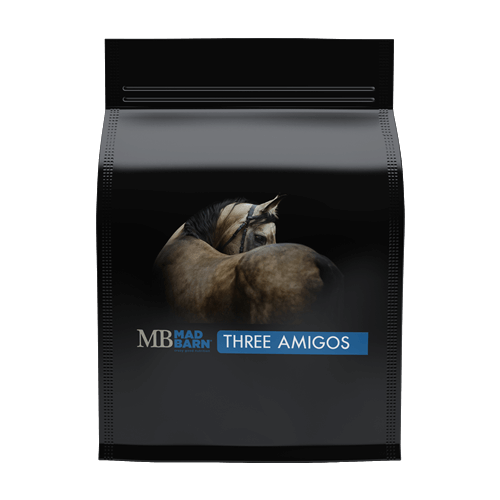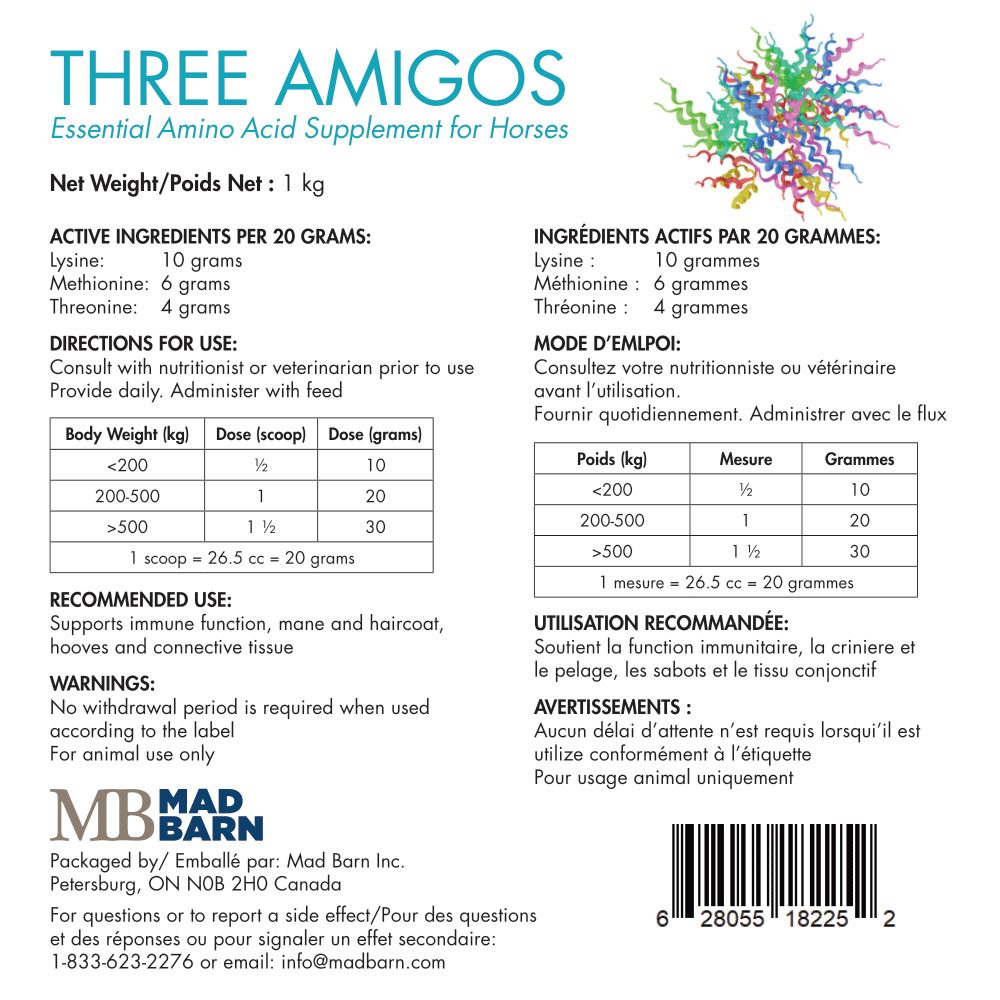MADBARN
MADBARN- THREE AMIGOS
Couldn't load pickup availability
*Larger sizes available please email for special order*
Three Amigos is an essential amino acid supplement for horses providing lysine, methionine and threonine in a 5:3:2 ratio. This tri-amino blend contains three rate limiting amino acids that are commonly deficient in the equine diet. Three Amigos can help to support your horse’s hoof health, hair and coat quality, immune function, joints and muscles as well as athletic performance.
Mad Barn’s Three Amigos is an equine essential amino acid supplement providing an ideal blend of lysine, methionine and threonine to support your horse’s health and wellness.
Lysine, methionine and threonine are the three main limiting amino acids in the horse’s diet. Amino acids are molecules that serve as the building blocks of protein.
Optimal protein synthesis can only occur when all essential amino acids are sufficiently available. Essential aminos cannot be synthesized within the body and must be supplied by the diet.
If horses do not get adequate amounts of these three rate limiting amino acids in their diet, it can result in impaired protein synthesis and have negative consequences for immune function, growth, performance and overall health.
Our pure Three Amigos supplement can provide adequate levels of lysine, methionine and threonine to support optimal protein synthesis in all cells of the body. This will ensure that your horse has the structural proteins, enzymes, and immune components needed to promote complete wellbeing.
In horses, lysine is the first limiting amino acid meaning it is most likely to be low in the diet relative to physiological requirements. Protein synthesis rates will not be optimal until there is enough lysine available. Methionine and threonine are often considered the second and third limiting amino acids for horses.
Horses that have poor hoof growth, poor coat quality, or loss of muscle mass might have a protein deficiency in their diet. Low milk production in lactating mares and poor stamina are additional signs of deficiency.
Ensuring that your horse receives adequate levels of lysine, methionine, and threonine in their diet could correct amino acid imbalances, supporting normal function of all tissues in the body.
LYSINE
Lysine supplementation is recommended to support bone growth in growing horses as well as healthy joints in exercising and aging horses.
Lysine enhances calcium absorption from the gut, increasing the availability of this mineral for the formation of healthy bones and supporting muscle and nerve function. [5]
Lysine is also essential for the formation of collagen, a structural protein that makes up skin and bones.
It is also required to synthesize carnitine, a vitamin-like nutrient that is important for the production of energy from fat tissue. Exercising horses may benefit from lysine to support energy metabolism and athletic performance.
According to the NRC (2007), a 500 kg horse at maintenance requires a minimum of 18 grams per day of lysine with optimal intake estimated at 27 grams per day.
Exercising horses require between 29 to 35 grams of lysine depending on how much exercise they gets.
At different life stages, the protein and lysine requirements of your horse change. For a 170 kg weanling (4-10 months of age), the requirement is 29 grams per day. Yearlings (11-17 months) require 48 to 50 grams per day.
THREONINE
Threonine is an amino acid that is important for the digestive tract and nutrient absorption. Between 60-90% of dietary threonine is used by the tissues in the gut.
Threonine is required to produce mucin proteins which form a protective barrier in the intestines. When dietary threonine is low, it is prioritized for mucin production and may not be available in adequate amounts to support muscle growth or protein synthesis. [2]
Horses that are susceptible to gut problems may benefit from threonine supplementation. High-grain diets fed to performance horses can cause microbial imbalances that injure the intestinal lining and lead to ulcers.
Supplemental threonine might help these horses handle high-grain diets and improve nutrient absorption leading to improved overall health and stamina.
According to the NRC, a 500 kg horse at maintenance requires 17 grams per day of threonine for optimal protein synthesis. [1]
Exercising horses have a greater demand for protein synthesis during exercise recovery. They require 19 to 22 grams of threonine daily depending on the intensity of their workload.
Growing animals also have higher needs. For a 170 kg weanling (4-10 months), the threonine requirement is 18 g per day. For a yearling (11-17 months), the requirement is 29 g per day.
METHIONINE
Methionine is an important precursor for the production of the antioxidant glutathione. [4] Horses that have inadequate levels of this amino acid might show signs of oxidative stress including slow recovery from exercise as well as more frequent illness.
Methionine helps maintain healthy joints, connective tissue, cartilage, and hooves. Horses with weak hooves might benefit from supplementation to strengthen hoof structure.
Methionine is converted into the amino acid cysteine, which is a sulfur-containing molecule that helps proteins maintain their structure. It is especially important for glucosamine, collagen, and keratin formation, which are proteins that are abundant in joints, connective tissue and hooves.
Methionine is also converted to s-adenosyl-L-methionine (SAM), which is an important methyl donor in all cells. [4] It provides a methyl group (one carbon with 3 hydrogen atoms attached) to numerous compounds like DNA and proteins which alters their function.
The NRC (2007) estimates that a 500 kg horse at maintenance requires 7.5 grams per day of methionine.
Growing horses require between 8 to 11 grams per day [3] and horses that are exercising require 8 to 10 grams total depending on the intensity of exercise.
You should always consult a qualified nutritionist before altering your feed program. Submit your horse’s diet for analysis online and one of our equine nutritionists will be happy to provide a complementary review.
REFERENCES
- Mok, Chan Lee and Urschel, Kristine L. Threonine as a limiting amino acid in equine diets. Asian-Australas J Anim Sci. 2020.
- Law, Garson K. et al. Adequate oral threonine is critical for mucin production and gut function in neonatal piglets. Am J Physiol Gastrointest Liver Physiol. 2007.
- Winsco, Kelly N et al. Influence of methionine on growth and nitrogen balance in weanling quarter horsesJ Anim Sci. 2011.
- Brosnan, John T. and Brosnan, Margaret E.The sulfur-containing amino acids: An overview J Nutr. 2006.
- Tome, Daniel et al. Impact of low protein and lysine-deficient diets on bone metabolism (P08-072-19). Curr Dev Nutr. 2019.
- Brosnan, John T. and Brosnan, Margaret E.The sulfur-containing amino acids: An overview. J Nutr. 2006.





